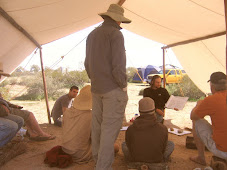Keeping this in mind, I asked Matt how he sustained himself while in the wild. What foods did he eat? It was a very simple answer: most of his calories and nutrients came from trapped squirrels, rabbits, and rodents. He would eat watercress salads with other wild greens, as well minimal amounts of other wild plant foods. Yet animal foods were hi s main source of sustenance. When eating an animal, he ate the entire carcass (barring large bones, guts or fur). After cooking, he consumed the organ meats first, then the rest of the animal, crunching down any easily chewed bones along with it. When asked about fish in the area, Matt replied that he ate fish maybe one or two times a week -- no more than that, though. Why? Because he noticed that while he subsisted mostly off of fish he felt fatigued and not as strong as when consuming mainly squirrels. Apparently, the Apaches also avoided eating too much fish, according to Matt.
s main source of sustenance. When eating an animal, he ate the entire carcass (barring large bones, guts or fur). After cooking, he consumed the organ meats first, then the rest of the animal, crunching down any easily chewed bones along with it. When asked about fish in the area, Matt replied that he ate fish maybe one or two times a week -- no more than that, though. Why? Because he noticed that while he subsisted mostly off of fish he felt fatigued and not as strong as when consuming mainly squirrels. Apparently, the Apaches also avoided eating too much fish, according to Matt.
 s main source of sustenance. When eating an animal, he ate the entire carcass (barring large bones, guts or fur). After cooking, he consumed the organ meats first, then the rest of the animal, crunching down any easily chewed bones along with it. When asked about fish in the area, Matt replied that he ate fish maybe one or two times a week -- no more than that, though. Why? Because he noticed that while he subsisted mostly off of fish he felt fatigued and not as strong as when consuming mainly squirrels. Apparently, the Apaches also avoided eating too much fish, according to Matt.
s main source of sustenance. When eating an animal, he ate the entire carcass (barring large bones, guts or fur). After cooking, he consumed the organ meats first, then the rest of the animal, crunching down any easily chewed bones along with it. When asked about fish in the area, Matt replied that he ate fish maybe one or two times a week -- no more than that, though. Why? Because he noticed that while he subsisted mostly off of fish he felt fatigued and not as strong as when consuming mainly squirrels. Apparently, the Apaches also avoided eating too much fish, according to Matt. My guess as to why this would be (and Matt agreed) is that fish are not nearly as fat-rich as wild land mammals. Not only that, but I would add that fish consist of mainly monounsaturated and polyunsaturated fatty acids and very little saturated fats. In a primitive living scenario where most of the calories are coming from animal flesh, it would seem important to get the right mix of fatty acids, including saturated fats, to meet the needs of the human body, which has a similar fatty acid content to pork: mostly saturated and monounsaturated. If starchy or sugary plant foods are available in abundance, then the body can make the saturated fatty acids it needs from those carbohydrates. But when only animal foods are being utilized -- which is more common than not in primitive living -- getting the wrong mix of fatty acids could cause problems in the long run.
I would hazard a guess, therefore, that Matt and the Apaches experienced fatigue from fish due to an over-abundance of mono and poly-unsaturated fats and a lack of saturated fats. This is important to understand because the body needs saturated fats to function properly and optimally. So, it would make sense that Matt felt better eating squirrels and rabbits than he did eating mostly fish, as the land mammals have a higher percentage of saturated and monounsaturated fats. It seems that these are the most likely fats that our human ancestors evolved on according to stable isotopic analyses of ancient bones which reveal a diet of terrestrial grazing animals and "freshwater foods" (the latter can indicate fish, shellfish, and/or waterfowl and other creatures that feed on aquatic plants and animals -- my guess is that waterfowl, with a more optimal fatty-acid profile, played a significant role in this type of food pattern).
Another intriguing tidbit that Matt offered me during our conversation was his discovery of -- and feasting on -- a deer carcass. It may have been left by a hunter or Matt himself may have trapped it -- I don't recall for certain. At any rate, he was able to procure a large deer carcass with plenty of meat and fat. When Matt came across this find, he had been living off of squirrels and rabbits and wild edibles for quite a while. He had lost a lot of weight, and he felt good in his leaner body, but he was unsure how long he could feel strong with his lower body fat percentages. The deer carcass provided him with much-needed calories, and he realized that he would have to take it easy and not gorge himself into indigestion and discomfort. Despite this intellectual acknowledgment, Matt ended up eating over ten pounds of meat and fat in one sitting. He exclaimed, "I thought I was going to feel horrible, but I felt great!" The meat was digested smoothly and efficiently, sparing him from losing more much-needed fat from his body.




